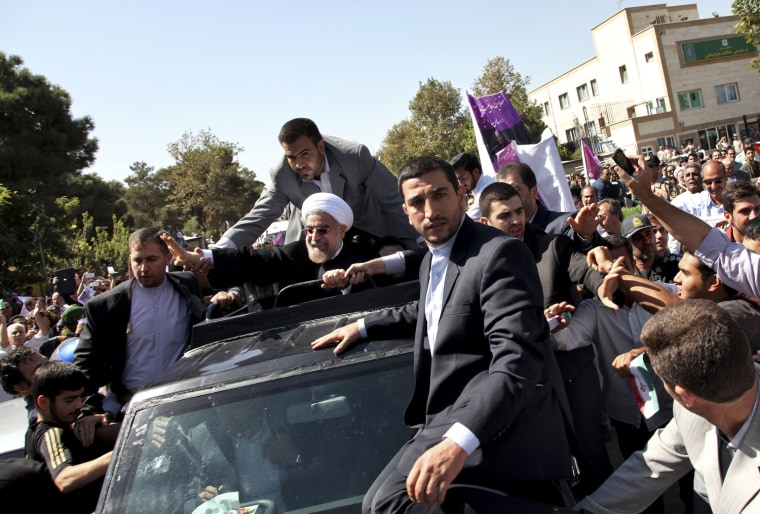TEHRAN – Opponents of President Hassan Rouhani booed and threw tomatoes, eggs and shoes at his car after Iran’s new leader returned from a ground-breaking visit to the United States, according to several witnesses.
The episode involving dozens of protesters lasted less than a minute.
Meanwhile, a larger crowd of supporters of the president, whose historic telephone conversation with President Barack Obama capped a publicity blitz streak that began with his sit-down with NBC News' Ann Curry last week, sacrificed a lamb in his honor and cheered him at the airport after his plane landed.
The different groups held up competing placards, according to the New York Times’ Thomas Erdbrink.
Obama revealed on Friday that he had talked with Rouhani, marking the first time leaders from the U.S. and Iran have directly communicated since the 1979 Iranian revolution.
"Just now I spoke on the phone with President Rouhani of the Islamic Republic of Iran," he said from the White House.
Rouhani spent the last few days at the U.N. General Assembly meeting in New York, making a number of public addresses indicating that Iran might be open to a deeper relationship with the U.S. and the West, and resolving conflict around his country's nuclear program.
This was not met as a positive step by some in Iran.
Rajanews.com news website said there was no justification for Rouhani to talk to the "Great Satan," a term for the United States, adding that the conversation was "useless."
Javad, a student and teacher who was at the airport, agreed with this stance.
“I am against talks with America,” the 30-year-old told NBC News. “We did not have a revolution to make friends with America. Our new president is making a mistake if he thinks the Americans will honor a deal. We must stand firm or they will try and ruin our country.”
Iran and the United States severed diplomatic ties in 1980 after students supporting the Iranian revolutionaries who overthrew the U.S.-backed Shah Mohammad Reza Pahlavi of Iran took 52 Americans hostage for 444 days.
But supporters of Rouhani in Tehran, who decisively won the June election, were also making themselves heard.
“We have been waiting a long time for this,” said Marjan Samiee, a 33-year-old housewife. “I was very happy to hear that both our leaders spoke, I never thought this would happen. Let’s us hope this good will continues and we can put our differences aside.”
Architect Layla Rezaei said she was surprised and happy that the two sides were talking.
“I did not think it would happen, especially this quickly,” said the 41-year-old architect. “This is an opportunity that has not happened in 30 years and both sides should not waste the opportunity.”
Alaeddin Boroujerdi, who heads parliament's foreign policy and national security committee, was quoted in the media as saying that the 15-minute telephone conversation between the two presidents showed Iran's “might.”
Iranians are desperate for a removal of the sanctions, which have devastated the economy, with unemployment and inflation sky-high as a result of them. Ordinary tasks such as banking and getting medicine for sick patients are next to impossible. And Iran's oil output has plummeted, costing the country millions per year.
On Tuesday, Rouhani told the U.N. General Assembly that Iran poses "absolutely no threat to the world" and that the sanctions imposed by the U.S. are "violent — pure and simple" and "intrinsically inhumane."
As his stay at the U.N. wrapped up on Friday, Rouhani had nothing but kind words to say about the United States in a news conference: "The atmosphere is quite different from the past," he said. "Our goal is the shared interest between the two nations. Our goal is resolving problems, our goal is step-by-step creating trust between the governments and peoples."
Obama noted that his conversation with Rouhani, which took place as the Iranian president headed to the airport, "underscores the deep mistrust between our countries, but also indicates the prospect of moving on that difficult history."
Rezaei, the architect, agreed that any process of reconciliation would be a difficult and slow one, but rapprochement was possible.
“I don’t think our government and the Americans will be best friends tomorrow but it could improve a bad atmosphere that has existed since the revolution,” she said. “We and the American people have a lot in common and it would be good to have relations. But I feel it is still early days.”
NBC News' F. Brinley Bruton contributed to this report.
Related:
